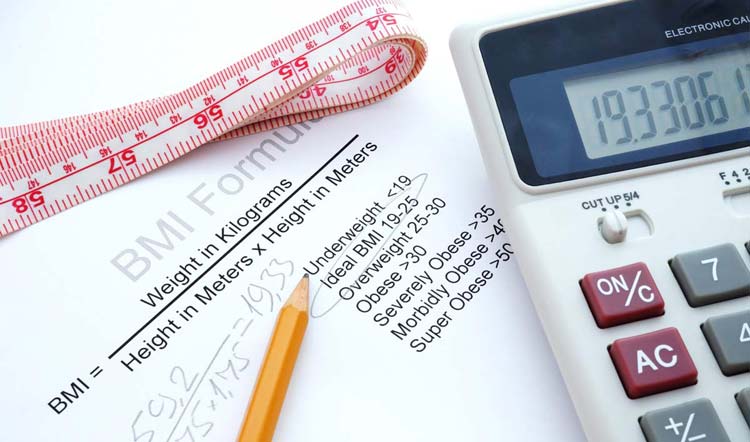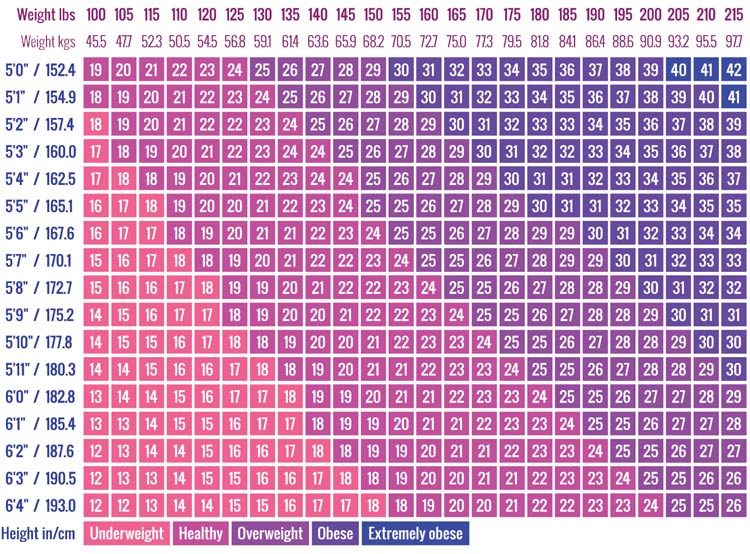Thursday, October 18, 2018
how to work out bmi?
How To Calculate Your BMI
Body mass index is a measure of body fat and is commonly used within the health industry to determine whether your weight is healthy. BMI applies to both adult men and women and is the calculation of body weight in relation to height. This article delves into the BMI formula and shows you how to calculate your BMI manually using mathematics.

BMI formula
The formula for BMI was devised in the 1830s by Belgian mathematician Adolphe Quetelet. BMI is universally expressed in kg/m2. If imperial units are used (pounds and inches) then an additional conversion factor is applied.
The first formula we've listed below is the metric formula, using kilograms and meters. The second one is the English imperial formula, which uses units of pounds and inches.
Metric BMI Formula
BMI = weight (kg) ÷ height2 (m2)
Imperial BMI Formula
BMI = weight (lb) ÷ height2 (in2) × 703
Let's go through a couple of examples to demonstrate how these formulae work.
How to calculate your BMI (metric units)
Simple steps to work out your BMI:
- Multiply your height in meters (m) by itself
- Divide your weight in kilograms (kg) by your step 1 result
Example using formula
For an adult with height of 180 cm and weight of 75 kg. Our first step needs to be to convert the height into meters (British spelling: metres). As there are 100cm in a meter, we divide our figure by 100. This gives us 1.8m.
Let's plug those figures into our formula:
BMI = 75 ÷ (1.8 × 1.8)
BMI = 75 ÷ 3.24
This gives us a BMI figure of 23.15.
How to calculate your BMI (imperial units)
Simple steps to work out your imperial BMI:
- Multiply your height in inches (in) by itself
- Divide your weight in pounds (lb) by your step 1 result
- Multiply the result from step 2 by 703.
Example using formula
For an adult with height of 5ft 11 inches and weight of 155 pounds (lb). Step one is to convert the height into inches only. There are 12 inches in a foot, so we simply multiply the 5ft by 12 and then add the 11 inches. This gives us a total of 71 inches.
Let's plug those figures into our formula:
BMI = (155 ÷ (71 × 71)) × 703
We do the multiplication inside the brackets first:
BMI = (155 ÷ 5041) × 703
And then...
BMI = 0.030747867 × 703
This gives us a BMI figure of 21.62.
Of course, should you not wish to calculate BMI manually with the formula, you can use my popular BMI calculator or the interactive BMI formula below.
Metric BMI Formula
BMI =weight (kg)height2 (m2)=A
Note that the results given by the Interactive BMI Formula should be used only as a guide and should not replace medical advice.
BMI Categorization
The BMI statistical categories below are based on BMI scores and apply to adults of age 20 years and upwards. The World Health Organisation (WHO) regards a healthy adult BMI to be between 18.5 and 25.
| BMI | BMI Category |
|---|---|
| Less than 15 | Very severely underweight |
| Between 15 and 16 | Severely underweight |
| Between 16 and 18.5 | Underweight |
| Between 18.5 and 25 | Normal (healthy weight) |
| Between 25 and 30 | Overweight |
| Between 30 and 35 | Moderately obese |
| Between 35 and 40 | Severely obese |
| Over 40 | Very severely obese |
BMI Chart
I have included a BMI chart below, to give you a quick idea of how they look. To customise a version for your own height and weight, see my interactive BMI chart.

BMI remains controversial
We can't feature an article about BMI without touching upon some of the controversies surrounding it.
It is a common argument that the results BMI measurements provide are too general and do not consider the gender, build, age or ethnicity of a person. For example, professional athletes are often considered overweight or obese when using BMI measurements due to their muscle content, which weighs more than fat.
Similarly, as people age their bone density decreases. So, although they may seem to have a weight within the normal BMI range, their measurement actually needs to be scaled-down to reflect this. Alternatives to BMI do exist for those who consider BMI an inaccurate measurement tool.
Always speak to a Doctor or health professional for advice and guidance if you are concerned about your weight.
Subscribe to:
Post Comments
(
Atom
)
-
ChomChom Roller Dog Hair Remover, Cat Hair Remover, Pet Hair Remover Revlon One-Step Hair Dryer & Volumizer Hot Air Brush, Black ...
-
10 Remedies And 8 Exercises To Get Rid Of A Double Chin Healifty V Face Band V Line Bandage Breathable Face Lift Belt Anti Wrinkle Ch...
How to moisturize vagina
How to moisturize vagina Vaginal Dryness: Causes and Moisturizing Treatments IN THIS ARTICLE Causes Diagnosis Medication Oth...



No comments :
Post a Comment